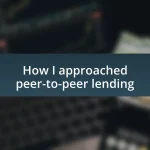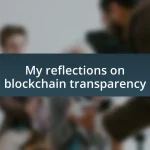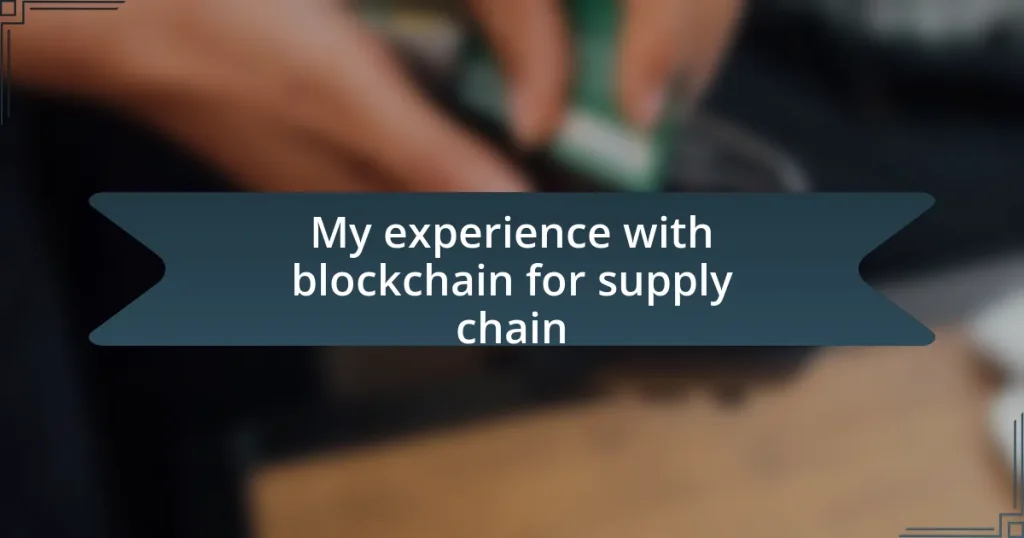Key takeaways:
- Blockchain technology provides secure, transparent, and immutable transactions through a decentralized ledger, transforming trust in supply chains.
- Implementation challenges include integration with existing systems, lack of standardization, and insufficient education among stakeholders.
- Notable applications include Walmart’s food tracking system, Maersk’s TradeLens for shipping paperwork, and blockchain usage in the diamond industry for ethical sourcing verification.
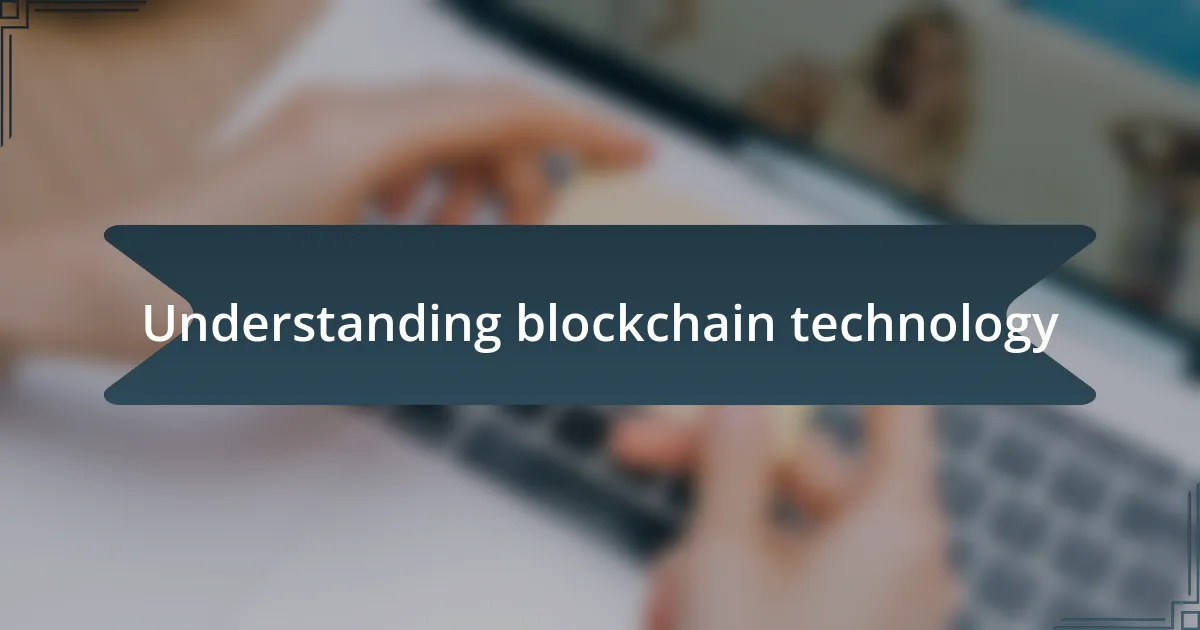
Understanding blockchain technology
Blockchain technology, at its core, enables secure and transparent transactions by utilizing a decentralized ledger. When I first encountered it, I was fascinated by the idea that information is stored across a network, making it nearly impossible for any single entity to manipulate it. Doesn’t it feel empowering to think about transactions happening without the need for a central authority?
One fascinating aspect of blockchain is its immutability. Once a transaction is recorded, it cannot be altered, which really struck me during my early explorations. I remember feeling a sense of security, realizing that this could fundamentally change trust in supply chains, where every player could verify a product’s origin and journey. What would it mean for businesses if they could confidently trace every step of their products?
Moreover, the concept of smart contracts within blockchain intrigued me. These self-executing contracts automatically enforce agreements when predetermined conditions are met. I once mused about how this could streamline supply chain processes, reducing friction and errors that had plagued traditional systems. Can you imagine a world where payments are automatically triggered once goods are delivered, eliminating disputes and delays? That kind of efficiency seems almost revolutionary!
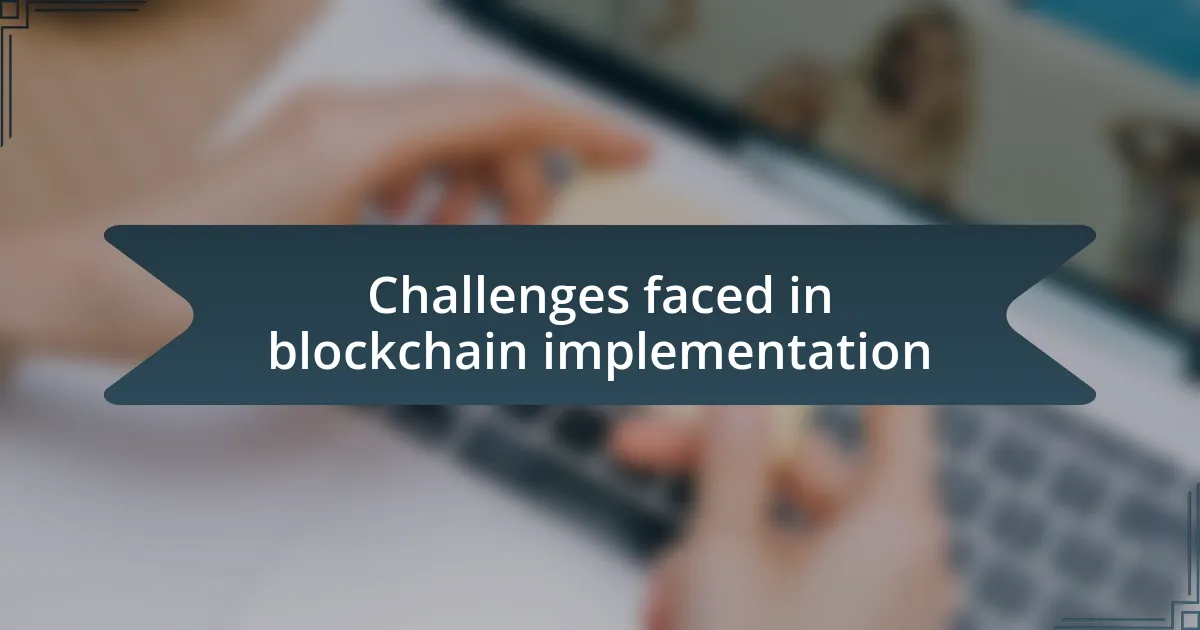
Challenges faced in blockchain implementation
Implementing blockchain technology in supply chains isn’t without its hurdles. One significant challenge I’ve observed is the integration with existing systems. When I worked on a project aiming to incorporate blockchain, we faced resistance from teams who were comfortable with their traditional methods. It’s always a delicate balance between embracing innovation and managing the fear of change that comes naturally in the corporate environment.
Another issue that arises is the lack of standardization across the industry. While exploring various blockchain solutions, I realized that different organizations have different interpretations of how blockchain should be implemented. One time, during a meeting with potential partners, we struggled to find common ground just because we used different protocols. It made me appreciate the importance of establishing universal standards; without them, interoperability can feel like an uphill battle.
Moreover, the education and understanding of blockchain among stakeholders can’t be overlooked. I remember a particularly enlightening conversation with a supply chain manager who was skeptical about its benefits. Many colleagues need continued training to grasp the technology fully and its implications. Without this foundational knowledge, projects can lose momentum, leading to stalled initiatives and wasted resources.
| Challenge | Description |
|---|---|
| Integration with Existing Systems | Resistance from teams and fear of change due to comfort with traditional methods. |
| Lack of Standardization | Diverse interpretations of blockchain implementation lead to compatibility issues. |
| Education and Understanding | Stakeholders often lack the necessary knowledge, causing stalled initiatives. |

Real-world examples of blockchain applications
When I reflect on real-world blockchain applications in supply chains, one standout example is Walmart’s initiative to trace food products. They implemented a blockchain system to track the journey of produce from farm to store, significantly reducing the time it takes to trace contamination issues. I remember the moment a surprising recall took mere seconds to identify the source thanks to this technology; it was a game-changer that showcased blockchain’s potential for enhancing food safety.
Another interesting instance is Maersk, which partnered with IBM to develop TradeLens, a platform that digitizes shipping paperwork and provides visibility across the supply chain. I’ve seen how this collaboration has streamlined operations for shipping companies, reducing paperwork and errors. Isn’t it fascinating how one technology can save countless hours and costs in logistics? It made me realize the monumental shift blockchain can create, not just in efficiency but in the overall trust between partners.
Lastly, supply chains in the diamond industry are leveraging blockchain to authenticate the provenance of diamonds and ensure they are conflict-free. During one project discussion, a colleague shared how the technology brings peace of mind to consumers, enabling them to verify the ethical sourcing of the stones they purchase. This transparency fosters trust and raises important questions about ethics in global supply chains. How can we move forward without this level of accountability in other industries? This experience highlighted that blockchain is not just a buzzword; it’s a vital tool for ethical practices.

